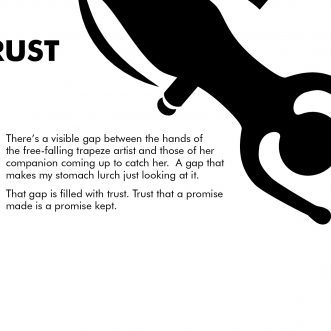
Outsourcing
Last October I decided to write a book. In a sense I had already written it – my idea was … Read More “Outsourcing”

Last October I decided to write a book. In a sense I had already written it – my idea was … Read More “Outsourcing”

When times are good, or you think nobody will notice, it’s tempting to overload systems, processes and people.
A little cut here, a small increase in workload there. A freeze on recruitment, a delay of re-equipping or upgrading. It has no visible effect on the bottom line. You get away with it. So it becomes tempting to do it again. To ‘keep it lean’, ‘cut no slack’, ‘lean in’, give 110, 120, 150%. And again, and again.
But, when you’ve cut everything to the bone, and built your entire system on just in time, lowest cost, no slack, it doesn’t take much to bring the whole thing crashing down.
It’s not rocket science. We live in a system. All of us. And overloading it is not sensible behaviour.

Before mobile phones, you had no choice about being out of touch outside working hours. You either got everything done during the working day or you didn’t. Even if you worked late, you could properly relax at home.
If you knew you were going to be away from your desk for a few days, you left it so that someone else in the office could pick up a call and handle things in your absence. You could concentrate on the job you were actually doing.
If you needed to get a report written or a complex spreadsheet set up, you deliberately took yourself out of reach of the banter, ‘quick questions’ and interruptions. You could give the job the attention it deserved.
All of this made us more productive, not less. And we were probably less anxious and stressed too.
Now, putting yourself out of touch has to be intentional.
And it’s a skill worth learning, for everyone’s sake.

I wonder how many people will be working from home over the next few months? And how many of the professional service businesses they work for, like accountants, solicitors, surveyors, architects, will realise that this is a completely practicable way of working?
Of course, it will focus the minds of everyone in the business on what really matters on measuring performance – deliverables and results rather than attendance or time spent, and it may require support tools to be put in place (nowadays easily and cheaply available on the cloud).
But if they do this, many businesses will realise that they can trust their teams to do what’s needed, when it’s needed, without surveillance, and that may mean they start looking at how they can support responsible autonomy even more effectively.
That could be a deep silver lining to the coronavirus cloud.

Over the last 4 decades I’ve visited quite a few cotton mills that have been preserved as museums. The thing that always struck me was how old the machinery was. Often it had been in place for 90 -100 years. Had nobody invented better machines during that time?
Yes they had. But if you can find cheaper labour to mind your old machines, you can get away without upgrading them. And that had worked for a good while on our textile industry. But sooner or later a more efficient business (or one with access to even cheaper labour) will take you out.
In a service industry value is generated by people rather than machines. If you’re in it for the long term, its going to pay to invest in them, to support them with more efficient tools and processes, to upgrade, re-equip and refresh the source of your profits.
Or are you planning to keep the same ones for 100 years?

This week, my husband took his father on a 90-mile round trip to see a consultant, only to be told “We don’t do that here.”
Why?
For the same reason a jury of 12 people can hang around for days waiting for a case, only to file into a courtroom and be told “We can’t try this case now.”
Because the process has been designed around the wrong role.
No wonder we have a productivity problem.

One reason why we can feel overwhelmed at work, is that we don’t use triage enough.
Simple triage for unexpected client phone calls and emails:
Every customer has top priority. That needs managing.

One key way to reduce the volume of interruptions you receive, is to consider before you interrupt others.
Following on from yesterday’s post, here is another simple triage:
Respecting other people’s time helps them to respect yours.

Once people had seen a wheel, they didn’t have to invent it. They used it to improve a process – moving heavy things, hunting, war, playing.
Once people in England had seen a brick house, they didn’t have to invent it. They used it as a model for building new, bigger, more comfortable houses. Then they used it as a model to build more comfortable and permanent houses for more people.
Once people saw the internet, they didn’t have to invent it. They used it to re-invigorate old processes – shopping, talking, sharing information.
Once you have a process for doing something, you don’t have to invent it. You can build on it to regenerate old processes you want to keep, or to create new processes that were not possible before. You can use it to come up with a much better version.
Our civilisation is built on streamlining processes to make room for inventing new ones.
Many people see ‘process’ as restrictive, stultifying, oppressive.
That’s not because it’s process, it’s because people are inventing the wrong things.

Quiet weeks, when nothing much happens, drag by while we’re in them. Afterwards, they almost disappear from our memories. We tend to remember the last interesting event before that quiet week as if it was only yesterday.
This is understandable. We are constantly bombarded with information, and most of the time what this information is telling us is boring – its OK, everything is normal, no need to worry. The unusual or extreme is what we need to take note of. Up or down, good or bad, high or low.
So while of course we should constantly measure what matters to our business, it makes no sense to report it if everything is normal. Let’s save our energy for dealing with the highs and lows.